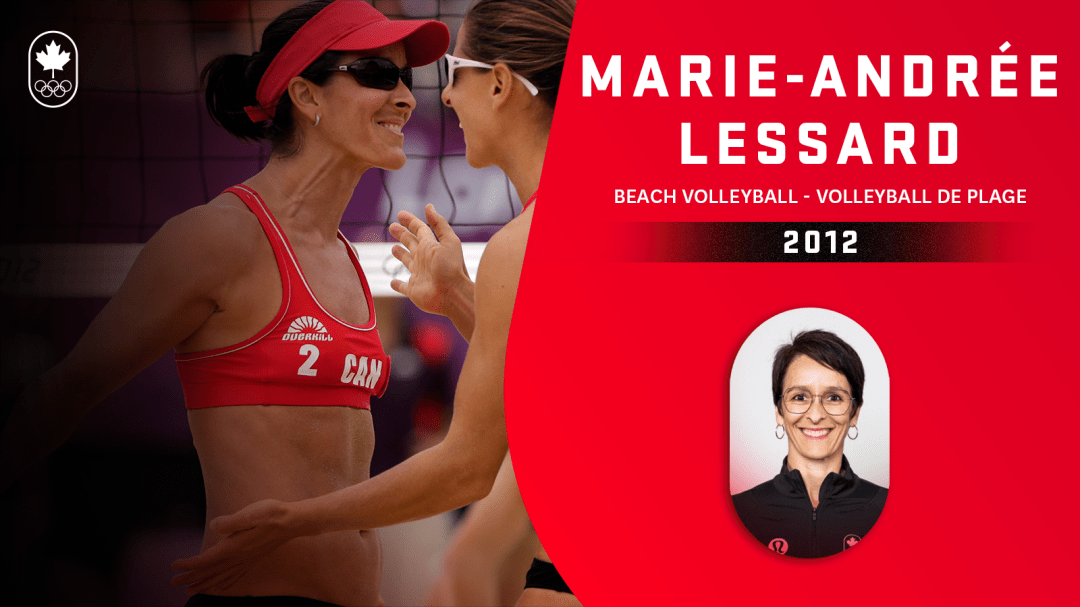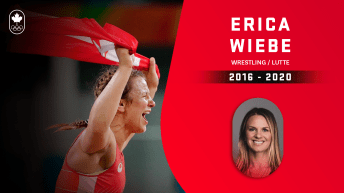Team Behind the Team: Meet Marie-Andrée Lessard, Olympian in beach volleyball & Senior Director of Games at the COC
The Canadian Olympic Committee (COC) is proud to put athletes at the heart of everything it does. At all levels of our organization, from our Board of Directors to our interns, our team is comprised of people who truly believe in the power of sport – including an impressive group of Olympians, Paralympians, Pan American Games athletes, former national team athletes, rec league athletes, and passionate sport lovers. In this series, we’ll share stories from members of our team who have competed at major multi-sport Games and who are now dedicating their professional lives to helping the next generation of Team Canada athletes live their dreams.
Marie-Andrée Lessard is a three-time national beach volleyball champion (twice with her partner Sarah Maxwell in 2005 and 2007, and again with Annie Martin in 2009). In 2012, Lessard and Martin competed at the London 2012 Olympic Games. She joined the COC in 2015 and now oversees the Games team, responsible for sending Team Canada to each major Games.
This interview has been edited for length and clarity.
How did you get involved in your sport?
My parents gave me the opportunity to participate in as many sports as I wanted in elementary school. I remember showing up for gymnastics when I was 10 and the club asked, “what do you want to do?” I told them I wanted to go to the Olympics. They said I was too tall. I was really bummed. I really liked it, but I didn’t want to do it if I couldn’t achieve my dream.
When I got to high school the only sport there was indoor volleyball and so I signed up. There was a day when the coach asked what our objective was and mine was to represent Canada and go to the Olympics. The coach said, “You’re way too short for that.” I was thinking come on people, I’m too tall for gymnastics and now I’m too short for volleyball. But I was already far too deep into it to turn back and that coach lit a fire under my butt.
I continued to climb the ranks and was the final one to make Team Quebec. The coach told me I was the fastest and the most powerful but again I was too short. So, I just accepted that it was part of my story.
Originally, I started playing beach volleyball to complement my indoor season. Then in 1996, it became an official Olympic sport and I thought “wow, this is great” and from then on, the path had been laid ahead for me to chase my dream.
How did you get involved with the COC?
When I retired in 2012, I had a transition that lasted about two years. I had been a self-funded athlete so I always felt I was running my own little business.
One of the first things I did after retiring was publish a book -100 Athletes, 100 Recipes, with contributions from Olympic gold medalist Mikaël Kingsbury, 1984 silver medalist in diving Sylvie Bernier, and 14-time Paralympic gold medalist Chantal Petitclerc among others, including Bruny Surin, our Chef de Mission for Paris 2024.
In late 2013, the COC called me and asked if I’d like to be a part of the mission team for Sochi 2014. I accepted not really knowing what to expect because I had missed the preparation seminar. So, I got my visa to go to Russia and fulfilled the role. I guess it went well because a year later, the COC called to offer me a seven-month contract. It was originally an exciting in-between gig from some of my entrepreneurial ventures which has now turned into a full-time job eight and half years later.
What do you do now in your role as Senior Director of the Games?
My job is to work with the team to deliver the Games, whether it’s the Olympics, Pan Am Games, Youth Olympics, or any Games where the COC sends a team. We take care of registration, outfitting, travel, accommodation, and everything that pertains to creating an environment that supports the performance of athletes and coaches. We do this by working with high-performance directors or team leaders and managers from all of the National Sport Organizations that have athletes who are competing there.
How do you find success in your role?
As an athlete when I went to London, I remember stepping into the Team Canada lounge in the village and feeling right at home. At the same time, I had no idea of the work being done to create that environment. Maybe it was being naïve, but I thought of course there will be Canada flags everywhere and someone is going to get me the snacks I like that aren’t in the cafeteria, things like peanut butter that some athletes crave.
So, I learned that we really are the team behind the team that wants to make it feel seamless for the athletes. It’s almost like if we are noticed, it’s because we’ve done something wrong.
At the recent preparation seminar for the mission team for Santiago 2023, you gave the opening speech to the team members and your message was that we need to do the best we can with the tools we have and we need to trust that all are doing the same. Does that come from your experience as an athlete?
Hands down it does. How I approach leading my team and interacting with colleagues has certainly been influenced by this because I think there was a moment in my career where I questioned if we could perform in the world adopting this mentality. I realized it’s OK to be vulnerable. It’s OK to show up as you truly are, not know, and ask questions.
At the COC, we set a very high bar. But this philosophy makes us even more powerful. We don’t shy away from looking at the dark places that we have in ourselves or in operations. Sometimes we need to stop and ask why we do it this way or whether it’s the best way.
We need to remind ourselves that everybody’s out there doing the best they can with the tools that they have. As one of the best NOCs in the world, I think this allows us to perform at our best – when we’re not afraid to ask tough questions and when we’re not afraid to pivot if the situation requires it.
After having coaches tell you that you couldn’t make the Olympics because of your size, how do you approach difficult conversations at Games with athletes for instance, after a performance didn’t go as planned?
Words matter. It’s a fine line between offering support and assuming something about someone and what they might believe about their performance. I always tread very lightly because I want them to feel like we support them as human beings. First and foremost, our job is to be there to ask what we can do for them in that moment and make them feel supported.
What does it mean to the sports community that there are many retired athletes now working at the COC?
I hope that athletes feel like they have a voice from within and that we can paint the picture of what the athlete’s reality is. For our non-athlete co-workers, I think it projects that we are going to work hard, that we are going to be resilient, and we expect a lot from ourselves to honor the next generation of athletes.
What have you learned since joining the COC?
Having been at the COC since 2015, it’s been impressive to witness the culture shift and to have been part of that change. I have watched our leadership step up and lead with integrity and authenticity. That’s been a cool experience because sometimes you hear about toxic culture, and you don’t really know how you transform it. But I think we’re at a place where the culture at the COC is as healthy as it’s ever been. That’s something that I take away as a great learning as well for having lived through it and I’ve seen where we started from and where we are now.





